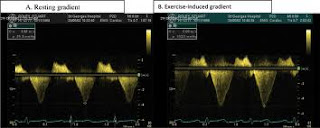Hypertrophic cardiomyopathy diagnosis
How is the diagnosis?
Medical history and any ECG changes suggestive of cardiac disease. In the further investigation is echocardiography, ultrasound of the heart, the main survey. Here, the doctor can see the thickening of the heart wall, and any abnormal pressure differences in the heart can be measured. When your doctor does not find evidence of another disease that could explain the enlarged heart, we can conclude that there is hypertrophic cardiomyopathy.
Other investigations that may do are exercise-test and 24-hour heart rate monitoring. Sometimes also made MRI of the heart. Genetic tests are of little use.
It is recommended that first-degree relatives (parents / siblings / children) examined the diagnosis in a person. Although family members do not have symptoms or signs of disease, it may still be changes in the heart.
It is usual to follow the relatives of controls (ECG and echocardiography) every other year in young adulthood and every five years in adulthood.

